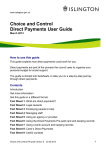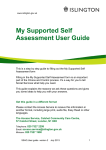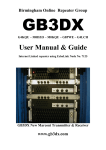Download Choice and Control Direct Payments User Guide
Transcript
www.islington.gov.uk Choice and Control Direct Payments User Guide September 2011 How to use this guide This guide explains how direct payments could work for you. Direct payments are part of the Choice and Control process the council uses to organise your personal budget for social support. The guide is divided into factsheets, to take you on a step-by-step journey through direct payments. Contents Introduction ………………………………………………..….. 2 Get more information ……………………………….………... 2 Get this guide in a different format ….……………………… 2 Fact Sheet 1: What are direct payments? ...........................3 Fact Sheet 2: Legal rewards …….……….……………………5 Fact Sheet 3: Employing people to help ...............................6 Fact Sheet 4: Managing staff ……………............................11 Fact Sheet 5: Keeping Records …………………..….………18 Fact Sheet 6: Carer’s Direct Payments………………………24 Fact Sheet 7: Useful contacts ………………..………..…….. 26 Introduction Direct payments means that if you get social care and support from the council, you can choose to have some or all of your personal budget paid to you, or someone you trust, so you can arrange your own support. Choice and Control DP guide version 3 1.9.11 1 As well as being in charge of your own money, you (or someone you trust) can employ and manage your own workers, or make your own contract with support providers. It’s all part of giving you more choice and control over your life. Direct payments are not considered as income and will not affect your benefits. The scheme is not the same as the Department of Work and Pensions Scheme to pay welfare benefits directly into bank accounts. Get more information You can get more information about direct payments, personal budgets and Choice and Control at www.islington.gov.uk/choiceandcontrol If you have a social worker, you can talk to them. Or, you can contact the Islington Council Direct Payments Team: 52D Drayton Park, London, N5 1NS Telephone: 0207 527 8164 Fax: 0207 527 3056 Email: [email protected] Get this guide in a different format If you need to receive this information in a different way please contact your social worker or the Access Service to discuss the most appropriate format for you. Please contact the Access Service. Email: [email protected] Telephone: 020 7527 2299 Minicom: 020 7527 1900 Choice and Control DP guide version 3 1.9.11 2 Fact Sheet 1: What are direct payments? If you’re over 16 and eligible for support from the council, we will take you through the Choice and Control process to find out what support you need to keep your independence and stay healthy and well. We’ll also work out how much money is available to pay for that support, and how you want to manage that support. If you want to manage your own support, instead of receiving services organised by Adult Social Services. you will be given your personal budget as a direct payment. , What can I use direct payments for? You can use your direct payments to pay for any support that will help you keep your independence, stay healthy and well and that is part of the support plan you agree with Social Services. The support or services you buy need to be legal and safe and not harm anyone else. They also need to fit with the goals or outcomes you worked out as part of your support plan. You might like to use your direct payment to pay for things like: employing a personal assistant or paying an agency help with washing, dressing and eating meals help with domestic tasks including shopping and housework short-term breaks, like a few days’ stay in a residential home hobbies, exercise, going to the gym, the movies, or seeing friends transport costs computers or other equipment Help to manage your direct payments If you need help to use direct payments, for example with using a bank account or finding a personal support assistant, you can ask someone you know and trust to help you. This person or group is sometimes called a nominee or third party. People who don’t have the mental capacity to agree to direct payments can still get them. They will need a suitable and willing person to receive the direct payment on their behalf. It needs to be a person who Adult Social Services, believe will act in the user’s best interests’. Help with direct payments: the Direct Payments Team You can get any help you need from the Social Services’ Direct Payments Team, including help with; completing your support plan, working out how much support costs and where you can get it from employing people, including writing job descriptions and their contracts keeping records about the money you spend Choice and Control DP guide version 3 1.9.11 3 They can help you over the phone and email, or they can visit you at home, at work or at a council office. There are also regular group meetings where users and potential users of direct payments can meet up and ask each other questions. You might like to come to one of these meetings to help you decide if direct payments will work for you. Ask the Direct Payments Team for more information. Direct Payments Team 52D Drayton Park, London, N5 1NS Email: [email protected] Telephone: 0207 527 8164 Fax: 0207 527 3056 Choice and Control DP guide version 3 1.9.11 4 Fact Sheet 2: Legal rewards Most people using direct payments use the money to pay people or agencies for the support or services they provide. But, direct payments can also be used to buy something for someone who has helped you, to say thank you or to help them support you- such as a friend, neighbour or acquaintance. This is called a legal reward. Money or wages do not change hands but a “gift” is given instead. By a small gift we would suggest a maximum legal reward value of £10 a week for any individual who provides informal support to you. Informal means that there is no structured timetable of support or set work tasks and no work contract (either explicit or implicit), no regular cash payment takes place and there is no expectation of there being a cash payment of any kind. Some examples of legal rewards are: • Buying a small bunch of flowers / box of chocolates/payment vouchers to say thank you • Taking somebody out for a meal to say thank you for the support and care they provide for free. • Paying for someone’s petrol in exchange for taking a user out. Legal rewards are not meant to be used to thank main, informal carers who provide substantive and regular support or who may receive carers’ allowance, or who may be receiving a Personal budget in their own right as a carer. This is because Carers’ Legislation gives recognition and support for these carers. Therefore Legal Rewards are more for recognition of ad-hoc types of support. Her Majesty Revenue and Custom (HMRC) have rules covering payment vouchers. These are seen as a small cash gift in kind and there is a ceiling above which these become taxable. £250 is the total amount that can be paid by one person to another per tax year. Therefore if this is the chosen use of legal rewards, the receiver needs to be aware that dependent upon their individual circumstances they may be liable to taxation and may have to declare any amounts paid to them for tax purposes. HMRC Tax helpline; 0845 300 0627 or for more information go to; http://www.hmrc.gov.uk/manuals/ihtmanual/ihtm14180.htm Anyone in receipt of a state benefit, who also receives a “legal reward”, should take independent advice on the likely impact on their benefits. The council’s income maximisation staff via mailto:[email protected] can provide advice. Choice and Control DP guide version 3 1.9.11 5 Fact Sheet 3: Employing someone to provide support This factsheet outlines the things you need to think about if you decide to employ someone to provide your support. If you want to employ someone to provide support, you will need to: 1. Write a job description and person specification 2. Advertise for people to apply 3. Interview the best people who apply 4. Choose the person you want to employ and check they have told the truth 5. Sign a contract with them about the job These steps are explained below. The Direct Payments team can help with all of these steps. Job description, person specification and application form A job description is a list of what you want the person to do. The person specification describes the skills or experience you want them to have. The application form sets out important questions you want to ask to find out more about the person who is applying. These documents become part of the contract you make with the person you employ to support you. In the job description you should: give details of the relationship you expect to have with your employee, and if necessary, anyone else who may be involved. explain the hours of work, rates of pay and other conditions of service, for example, financial arrangements if you go into hospital. emphasise that you will be in control and that your support worker is directly accountable to you as the employer. A person specification should list: the criteria necessary to carry out the job. It should include any skills, knowledge or aptitudes that the candidate needs – for example, interpersonal skills, IT or written skills, or expertise in a particular field. You may want candidates to have prior experience of performing particular skills or tasks. The Direct Payments Team has some examples that you can use to write your job description and person specification and an example application form. Choice and Control DP guide version 3 1.9.11 6 Advertising for people to apply You will need to write an advert that tells people you want to employ someone. The Direct Payments team has examples that you can use. You can advertise in, job centres, local colleges or careers offices, leisure centres, sports centres, local newspapers, magazines and on internet sites. You can also ask people you know to tell people you want to hire someone to support you. It is not a good idea to use your home telephone number or address when advertising for staff. Instead, you should ask the Direct Payments Team or another organisation that is helping you, to be a contact. You need to send the people who are interested in working for you the job descriptions, person specifications and the application form. The Direct Payments team can do this for you. Then, the people who are interested in the job send the application form back so you can decide if they are the right person to employ. It’s a really good idea to ask people to send the application form back to the Direct Payments Team. Don’t tell people your home address. Interviewing Now that you have applications forms, you can decide which people you think will be best at the job and ask to meet with them. The Direct Payments Team can help with every part of this step. You should look at every application form and check it against the job specification and person description you wrote. You might like to keep a list of who applied and why you do or don’t think they would be good at the job. You need to tell the people who you don’t want to interview that they do not have the job. You should then arrange to interview the people you think will be best at the job. Again, it’s a good idea not to interview them in your own home. The Direct Payments Team can help you find somewhere to interview them. Decide where and when to interview people, and then write, call or email them to let them know. You might want to send them a map showing where the interview will be. The purpose of an interview is to find out more about the person. To learn about their skills and experience and why they are interested in working for you. You can also decide if they are the kind of person you could work with. You should think of questions to ask at the interview. You need to ask everyone you interview the same questions, and they need to be about the job the person will be doing. Choice and Control DP guide version 3 1.9.11 7 You should decide how good the person’s answers to each question are, so you can work out who is the best person to hire. As a guide each interview should take about 20 to 30 minutes. You will need to explain to the person you are interviewing: what they need to do to support you how much you will pay them, and if they will get time off whether you will need them to be able to work for you at very short notice You can’t ask people questions about their race, religion, gender, sexual identity, age, disability, political beliefs or whether they are in a relationship. Wait until you have had every interview before telling the person you want to employ that they have the job. Then, once they agree to work for you, let the other people who were interviewed that they have not got the job. When you employ someone for the first time, there is usually a ‘probation period’ – a time when you or they can cancel the contract without having to say why. During the ‘probation period’, you or they can cancel the contract at any time. A probation period usually lasts three months. Once the probation period is up, there has to be a reason for the contract to end, and you and the employee have to agree how long they will work until the contract ends. The Direct Payments Team can tell you more about probation. How can I check that my worker has told the truth? Once you have chosen your successful candidate, we recommend that you do not officially offer them the job until you have received references. Ask for a verbal or written reference – or both – to get the opinion of someone who knows the candidate and can comment on their suitability for the job. It is important that one of the referees is the candidate’s last employer. The Direct Payments Team will recommend that you ask for an enhanced police check for your worker from the Criminal Records Bureau (CRB). The CRB will ask for this check on your behalf and the cost will need to be included in your support plan. A CRB is not compulsory if you can make your own decisions and the care is for yourself or for children when you will always be present. But we strongly recommend that you have all your staff police checked before they start working for you. If the person you want to employ will at anytime have sole charge of a child or children (escorting your child to school without you being present for example) you must carry out a CRB check before you employ them. Choice and Control DP guide version 3 1.9.11 8 If you are unable to make your own decisions, your representative must get a CRB check for anyone you buy services from, unless that person is a family member or friend already involved in providing your support. CRB checks can take several weeks, so you should start this process as soon as you have chosen your candidate. It is a criminal offence to employ someone who does not have permission to live or work in the UK. You must ask all your candidates for their Home Office documents and ask if they need permission to work in the UK. What is a contract of employment? A contract of employment is a legally binding agreement between you (the employer) and the employee. The contract takes place when an employee agrees to work for you in return for pay. As an employer you have a number of responsibilities towards your employee(s). Statutory responsibilities These are the minimum terms and conditions set down in the law, which cannot be avoided. Even if your employee signs a contract agreeing to something less than their statutory rights, these rights are protected by law and the employee can enforce them at any time. It is important to see your legal responsibilities as a way to build a good working relationship with your employee. The law protects both you and your employee. Contractual responsibilities These are the responsibilities you and your employee agreed to when your employee decided to work for you. Contractual rights and responsibilities cannot be less than the statutory requirements, and if you break them your employee could take action against you. Good practice As an employer, it is a good idea to meet more than just the minimum requirements of the law. For example, the law may say nothing about training your employees, but by providing training you are helping your worker to develop their skills and understanding. By law, every employee has to be given a written statement within eight weeks of starting work (Employment Rights Act 1996, Section 1). A written statement lists their main duties and responsibilities, holiday entitlement, back-up options, and house rules, confidentiality, use of vehicles and so on. A written statement will help avoid disagreement in the future and reduce the risk of disputes between you and your employee arising. As you will not know what your worker is really like until they start working for you, we recommend you state in the contract that they will be employed for a trial or probationary period, and their contract will be permanent if this trial period is successful. Choice and Control DP guide version 3 1.9.11 9 The direct payments team can advise you on changes to the law that may impact on your responsibilities as an employer. They can also supply you with a standard employee contract template for to use to use. Employing friends and family members Direct Payments are not intended to replace existing informal support networks within families and communities. However, some people who qualify for Social Services’ support do choose to employ friends and in some cases their family members as they will know and trust the person already. However, this may not be the best support arrangement for some users as a personal relationship will become a contractual relationship aswell and for example roles and expectations could become confused. There is no legal restriction if the family member lives in a separate household. If the family member lives with you, exceptional circumstances need to be evidenced and agreed by Social Services that this is required in order to meet your needs. Please discuss further with your social worker if you are thinking about employing a family member. Employing a previous worker who was employed via an agency It is advised that each service user takes independent legal advice prior to employing a personal assistant who has been working for them previously via another agency. This is because the worker may be subject to something known as TUPE regulations. (Transfer of Undertakings (Protection of Employment) regulations. This means the service user may have to pay a transfer fee as detailed in the agency contract the worker signed up to originally Local organisations who can provide free legal advice are detailed in Fact Sheet 7 Safety tips Do not use your home telephone number and address when advertising for staff. We recommend that you do not interview people in your own home or on your own. The direct payments team recommend that you ask for an enhanced police check for your worker, which is carried out by the Criminal Records Bureau (CRB). They will ask for this check for you and Adult Social Services will pay for it. Choice and Control DP guide version 3 1.9.11 10 Ask for written references for all staff. A CRB check is only valid up to the date it is completed and not everyone who is unsuitable to work with others has a criminal record. If you are concerned about your worker’s conduct or behaviour and need advice and support, please contact your social worker or the direct payments team. If it’s an emergency, call 999 Or, you can call the police’s Community Safety Unit on 020 7421 0174 Or, call the Access Service on 020 7527 2299. The council has a publication called ’Safeguarding me: keeping myself safe from harm’. It’s online at www.islington.gov.uk/safeguardingadults or call 0207 527 2299 for a copy. Choice and Control DP guide version 3 1.9.11 11 Fact Sheet 4: Managing Staff Once you have recruited your staff you will need to manage them on a day-today basis. The Direct Payments’ team can advise you on most aspects of managing your staff and can tell you about other organisations that can provide specialist support When you employ your new worker you will need to consider the following: Staff induction If you invest the time and energy into a providing a tailor-made and engaging induction for your new worker they are more likely to stay in the job for longer. An induction is an introduction to you, your home and the work the person needs to do. A good induction will also encourage a good working relationship. Ideas for your induction include: a description of all facilities such as toilets and fire exits explain how they fit into your team/support network explain all health and safety information – this is a legal requirement explain the terms and conditions of their employment give details of relevant cultures and values explain any house rules e.g. no smoking give a clear outline of their role and job allow your employee to shadow or work alongside an experienced colleague give details of any training you are providing go through a workbook or checklist of tasks required with them ask if they have any questions Training Your worker may need training on certain tasks to make sure they do them safely and in the manner you prefer, such as using a hoist or pushing a wheelchair. Training might involve you: demonstrating skills or tasks your worker needs to learn watching your worker and giving them feedback offering formal training courses such as manual handling. This will help your worker to build confidence and feel valued at work asking for training for you and your workers via the direct payments team. You and your staff can go on many training courses run by Islington Council. There is no charge for these courses. Choice and Control DP guide version 3 1.9.11 12 Keep a record of all the health and safety training you provide, as it is important that you obey health and safety law. If there is a serious event, the Health and Safety Executive and the insurance company that provide your employer’s liability insurance will need to see evidence that the right training has been carried out. Supervision and appraisals You need to decide how you are going to manage your worker’s role and workload. You could supervise, direct and discuss particular tasks on an informal, ongoing basis with your worker. You should encourage them to discuss any issues they have with you directly. You could allocate a set period each month for a supervision meeting. This will enable you to review how things are going for your staff and agree on changes or improvements to the way everyone works together. You could also have annual appraisal interviews for each of your workers. An appraisal gives you and your worker the chance to talk about how they performed over the last year, how they can improve over the next year and identify training and career-planning needs. Appraisals can uncover problems that may be limiting an employee’s progress or resulting in poor performance. Your worker should have the opportunity to sign the appraisal form and say what they think about the appraisal. Disciplinary and grievance procedures Disciplinary procedures may need to be used when there are problems with an employee’s behaviour or work. They are not often needed, but if a problem comes up they are vital. With good procedures in place you can sort out problems quickly and easily and avoid employment tribunal claims. They will help you to manage your workers effectively and should not be seen as a way to take legal action or lead only to dismissal. Grievance procedures are followed when your worker has a problem that cannot be sorted out informally with you. It is in your interests to sort out matters before they become more serious. The Direct Payments Team can provide more information and advice on all these procedures, or check ACAS’ (Arbitration, Conciliation and Arbitration Services) code of practice. Contact details at the end of this fact sheet. Both disciplinary and grievance procedures should be a last resort, not the first option, as most issues can be sorted out informally through good communication. A good induction, ongoing training and regular one-to-ones will help to avoid these kinds of issues arising in the first place. How much time can my worker take off? The Direct Payments Team can advise you on: current staff working-time regulations that you must follow. These are crucial because your workers can complain to an employment tribunal if Choice and Control DP guide version 3 1.9.11 13 you don’t give them rest periods, breaks or the paid annual leave they are entitled to. rights to maternity or paternity leave, parental leave rights or adoption leave rights managing short term and long term sick leave employees’ entitlement to a reasonable amount of time off work without pay to deal with an emergency involving someone they care for the right to ask for more flexible working times. This is available to your worker if they have a child under six or a disabled child under 18. If you refuse this request you will have to provide evidence on clear business grounds. dismissing your worker if they are on long-term sick leave. You must consider all reasonable options as you may have to satisfy an employment tribunal that you made a fair decision, and prove that you made efforts to help your worker to return to work, for example, by allowing them to work flexible working hours. . Paying your workers Your responsibilities for paying income tax and National Insurance will depend on whether your worker is self-employed or employed by you. The HMRC website has a useful tool known as The Employment Status Indicator (ESI) tool that we recommend you use. This enables you to check the employment status of an individual or group of workers - that is, whether they are employed or self-employed for tax, National Insurance contributions (NICs) or VAT purposes. You can find this at http://www.hmrc.gov.uk/calcs/esi.htm It is essential that you confirm your worker’s employment status at the onset of the employment arrangement so you are both clear about your responsibilities Contact the Direct Payments’ team if you have any further questions. If you employ a worker you are legally responsible for calculating their income tax and National Insurance contributions and paying regular contributions to the Her Majesty’s Revenue and Customs (HMRC). These payments are known as Pay As You Earn (PAYE) and are made in addition to salary you pay to your worker. If your worker is self-employed, they have to pay their own income tax and National Insurance. You will need to send Adult Social Services a copy of your worker’s employers’ liability insurance, as your worker is responsible for buying this, not you. Choice and Control DP guide version 3 1.9.11 14 If you have a contract with an agency they will pay HMRC direct. With personal budgets there is no fixed hourly rate and you can choose your workers’ hourly wage, as long as it is above the current minimum wage and within your budget. The Direct Payments Team can help you to work out an hourly rate and make sure you have enough money to pay your on costs such as National Insurance, administration costs and payroll charges. If your worker is your employee, and you are going to pay their tax using PAYE yourself, you can use the Simplified Deduction Scheme. The Employers Helpline can provide more information on this. See the end of this fact sheet for contact details. You will need to register with HMRC as a new employer. You will need your worker's tax code, which is on their P45. You will need advice on the current lower earnings limit, as employees can earn up to a certain amount before they start paying income tax or National Insurance. This amount is set by the government each year. As an employer you are liable to pay National Insurance contributions in addition to the salary you pay to your worker. The HMRC New Employer's Helpline can give you advice and send you the right PAYE scheme starter pack for your situation. Contact details are at the end of this fact sheet. If you don’t want to do your own payroll, there are many organisations that specialise in Direct Payments and personal budgets that can provide this service. The Direct Payments Team has a list of companies you might like to use. Call them on 0207 527 8164. You may also know an accountant or decide to use another company to do your payroll for you. The Direct Payments Team can advise you further on paying your workers. What do I have to pay my worker if my personal budget ends? A Direct Payment will come to an end in one of two possible circumstances; the Direct Payment is no longer needed or appropriate or if you die. In most circumstances, if your worker has had at least two years’ continuous service since the age of 18 they are entitled to redundancy payment. There is a national helpline for advice on redundancy. (Contact details at the end of this factsheet). If you are using a payroll company, they can advise you too. Choice and Control DP guide version 3 1.9.11 15 Under the Direct Payments or Personal Budget Agreement if you were the employer of a Personal Assistant, you or your estate is responsible for paying their wages, tax and National Insurance and any other payments that an employer following best practice should make to or on behalf of his/ her employees. Social Services are not responsible to HMRC, any agencies or employees who supplied support to you. Your pa’s should first approach you or your estate in relation to a redundancy payment. If you or your estate does not have sufficient funds to make a redundancy payment the user or next of kin/executor should check their employers' liability insurance policy, which, dependent upon the provider and policy held may include some provision towards redundancy costs. There is also the Statutory redundancy scheme which can be used when an employer is insolvent and contact details can be found at the end of this factsheet. However, if insufficient Direct Payments have been paid by LBI to you or, where an equivalent surplus Direct Payment has been recovered by LBI and there has been no mismanagement of funds, and financial monitoring has been completed and all your other liabilities or responsibilities have been met, LBI will consider making additional payments in respect of outstanding redundancy payments and pay, as advised by legal, on a case by case basis. ACAS (Advice Conciliation and Arbitration Service) can also offer further advice to employees and contact details are at the end of the fact sheet. The Direct Payments team can also support individual users and carers in the event of a direct payment arrangement ending. Health and safety issues to consider By law, if you employ staff directly you must take all reasonably practical steps to protect the safety, health and welfare of your employees. You have a legal duty to insure against accidents or injury to staff. The Direct Payments Team can help you to complete regular risk assessments of your home and the role of your personal assistants. Accidents can happen. For example, your worker could fall down the stairs whilst doing housework or have an accident outside your house when they were doing your shopping. In some cases you might be held responsible for these accidents and at risk of being sued if you have not taken reasonable measures to prevent them. You must take out employers’ liability insurance when employing staff, so that you are insured against your staff having an accident or becoming ill while working for you. You will need to fund the cost of the insurance from your personal budget. An insurance company that offer policies customised for people who employ their Choice and Control DP guide version 3 1.9.11 16 own workers is listed in Fact Sheet 7. You could choose to buy a policy from a different insurance company We recommend that you take out a good comprehensive home insurance policy to cover your property and its contents. If your worker uses your car, you must purchase at least third party car insurance. If your worker uses their own car in their job, you will need to check that their insurance has been extended to include business use. A safe working environment You are responsible for providing a safe working environment. Here are some useful tips to make sure that you do: Take a careful look at the rooms and equipment that your worker is going to use. Check that there are no obstacles or surfaces that could cause an injury from tripping or slipping, and that there is no danger of your worker burning or cutting themselves. Look at the equipment you use and check that it is safe and in good working order. If your worker is injured at work, you must make sure that they record the exact details of the incident as soon as they can. Safe working practices You must promote safe working practices for your worker. You must not do anything or ask your worker to do anything that may cause them to get hurt. Your worker must use the proper moving techniques and handling aids to protect themselves from injures, such as back strain. If you feel you need technical aids or equipment, speak to your occupational therapist or social worker. Your worker is responsible for taking care of their own safety and must tell you about any problems they have with any equipment in your home. Your worker should tell you if they are ill, or have injured themselves at work or away from work, if this could make a difference to the work they do for you. Your worker must have adequate protection against any harmful substances they may come into contact with. For example, if they use detergents, you must provide rubber gloves, eye protectors and any other protective clothing. Safe handling and hygiene You have a duty to make sure your worker has a basic working knowledge of safe handling techniques and hygiene practices Choice and Control DP guide version 3 1.9.11 17 You should either give this information to your worker, or arrange for them to attend a suitable training course. You can discuss your training needs with the Direct Payments Team. You and your employee are both responsible for making your home (or other place they will work with you) a safe place to work. You can do this by sharing information and carrying out regular risk assessments. Using an agency to provide support If you do not wish to take on the full responsibility of employing your own worker, you could use an agency. An agency can arrange the services you need. You let them know the times of the day that you need support and the type of support you need. However you may find this reduces the amount of control you have over your services and it can cost more than employing your own staff. You pay the agency rather than a personal assistant. Using an agency means you do not have to deal with your worker’s wages, tax and National Insurance. And you will not be left without support if your worker is unable to come to work, as the agency can organise a temporary replacement. You could think about using an agency as a contingency plan (this a plan you make in case your usual support arrangements break down) when your worker is on holiday or off sick. You need to register with an agency beforehand, so that the agency knows the type of support you need. There are a large number of home-care agencies to choose from. We recommend that you buy support from an organisation registered with the Care Quality Commission (www.cqc.org.uk). The Commission inspects health and social care organisations all over the country. Safety tips You can ask for training for you and your workers from the Direct Payments Team. If you and your worker get the right training you, will both feel more in control. You must take out employers’ liability insurance if you directly employ workers, so that you are insured against your workers having an accident or becoming ill while working for you. If you choose to use an agency, we recommend that you buy support from an agency who is registered with the Care Quality Commission (www.cqc.org.uk). Choice and Control DP guide version 3 1.9.11 18 If you are worried about how your support is being provided, and need support and advice, please contact your social worker, support broker or the Direct Payments team immediately. Useful contacts ACAS Telephone: 08457 47 47 47 www.acas.org.uk, Islington Council Direct Payments Team 52D Drayton Park, London, N5 1NS Email: [email protected] Telephone: 0207 527 8164 Fax: 0207 527 3056 HM Revenue and Customs new employer’s helpline Telephone: 0845 6070 143 Redundancy helpline Telephone: 0845 145 0004 Statutory Redundancy scheme www.direct.gov.uk/en/Employment/RedundancyAndLeavingYourJob/Redunda ncy/DG_10029836 www.insolvency.gov.uk Choice and Control DP guide version 3 1.9.11 19 Fact Sheet 5: Keeping records As personal budgets are public funds, Adult Social Services has to account for how they are spent. If you have chosen to receive your personal budget as a direct payment, you must show how you are using your money to achieve your agreed personal goals/outcomes, as detailed in your support plan. This requirement is outlined in your Personal Budget User Agreement. If you have chosen a personal budget, or if someone receives your payments for you, you or they must keep a record showing how this money is spent. You will need to send some of these records to Adult Social Services on request. The Direct Payments Team can help you to set up systems to manage your paperwork. So that you keep the records we need, we will ask you or your decision maker to: open a separate bank account pay your bills send all records to Adult Social Services manage your money pay your assessed contribution into your account on a weekly or 4 weekly basis There is more information on each of these options below. 1. Open a separate bank account To receive your personal budget, you will need a separate bank account. If you get money from other organisations like the Independent Living Fund or Access to Work you can keep this money in this account as well. If you have problems opening a separate bank account, let the Direct Payments Team or your broker know. They can advise you on the type of bank account you need to open and options that local banks can offer. You can choose a family member or close friend to open a separate bank account for your personal budget and to manage the account under your direction. You can pay another organisation to provide this service - see Fact Sheet 4 for further details. Adult Social Services has a bank account you can use if there are no other options available to you. If you have more than one bank account, please write ‘Personal Budgets’ on all cheque books or records relating to your personal budget account, to make sure you do not confuse this account with other accounts. Choice and Control DP guide version 3 1.9.11 20 2. Pay your bills We ask that you pay all personal budget-related bills by cheque, bank transfer or internet banking to record how you spend your money. No cash payments are permitted for employment costs e.g. wages, tax, national insurance payments If you or your decision-maker becomes an employer, you must pay tax and National Insurance. Payroll companies can do this for you. All employees must have a National Insurance number. You will need to allocate enough money per year out of your personal budget to pay for employers’ liability insurance. This will cover your workers against injury or accidents and is a legal requirement. If your workers are self-employed, it is your responsibility to ask for a copy of their insurance certificate. This is to be sure that they are adequately covered for the work they will be doing, and to check when the policy ends. If you need to make a financial contribution towards your personal budget, you will need to pay this into your personal budget bank account so that you have enough money to pay your bills. Cash payments are allowed for non-employee related costs. This includes travel fares, expenses for staff, food and drink and administrative expenses such as stamps and stationery. We recommend that you allocate a small budget from your personal budget for administrative costs for managing your personal budget. You could include for example: payroll costs stationery costs photocopy costs phone calls made to organise your support recorded delivery costs for posting original paperwork to Adult Social Services finance officer, ink cartridges if you use a computer to manage your payments, If you buy an item with your own money, for example, stamps paid for with cash, you can reimburse yourself by, for example, writing yourself a cheque from the personal budget account, Remember to keep any receipts. You can only use your personal budget for services and support to meet the agreed personal goals/outcomes in your support plan. Please check with your social worker if you are not sure what you can spend your money on. Choice and Control DP guide version 3 1.9.11 21 3. Send all records to Adult Social Services The records that the Adult Social Services finance officer asks you to send and how often you send them will be based on: the amount of your personal budget, how complex your budget is to manage, and your ability and confidence in managing the money. A personal assessment will take place to decide on the documents you need to provide, and how often - quarterly, six-monthly or annually. The Direct Payments Team can help you think about any extra support you may need to manage your records. When you have had a personal budget for about three months, at around the time of your first review, you or your decision-maker will be asked to send in all your paperwork. Our finance officer will check that your payments match the outcomes in your support plan, and that you or your decision maker can manage the financial side of your personal budget. If you have to make a financial contribution we will check that it is being paid into your account. You will need to send us the following information by post or email: all bank statements for your personal budget account, all invoices all receipts an employer’s insurance certificate if applicable your PAYE records We will return all original documents to you, and tell you which documents we need in the future and how often. Example 1 – you are managing your finances Once our finance officer has seen your documents and agreed that you or your decision maker is managing your money well, your bank statements will be reviewed in a year’s time. This means you won’t need to send us any paperwork for one year. However, you should still keep all your records, as we may need to check them later on. Other government bodies such as HMRC (the “Tax Office”) can ask for them for up to seven years. Example 2 – you have not set up a payroll system At your three month review if you are employing staff but you have not set up a payroll service, we will ask you to do this and you will need to pay the outstanding tax and National Insurance deductions. In this example we would ask that you continue to send us all documents including bank statements, payroll invoices, tax and National Insurance invoices and evidence of wages paid, for a further three months. Our finance Choice and Control DP guide version 3 1.9.11 22 officer will review your documents and let you know which document they need to see and how often you need to send them to us. We assume that you or your decision maker will get more confident at keeping records over time, and that we will not need to review your records so often. If your health or circumstances changes, you may need additional or different support to assist you to manage your records. If we don’t hear from you within a month of writing to you to ask for your records, we will arrange a face-to-face visit. You can invite your social worker or decision maker to this meeting. You must let us know if you are having difficulties or need more support to keep your records. If you still do not provide your records, your payments will be stopped. Your social worker or support advisor will then organise alternative support for you based on your eligible needs. 4. Managing your personal budget money If you don’t spend all the money in your personal budget bank account, you may be asked to pay some of it back. You must let us know in advance if you are saving some of your personal budget to buy additional services or support. A decision to recover money will be made with you. We will make sure that you have enough money in your account for bills, expenses and emergency costs. This is usually the equivalent of four weeks of your personal budget. If you wish to spend your personal budget on something different to anything agreed in your support plan, you will need to check this with your social worker to make sure it meets your personal goals/outcomes. Please let your social worker know if your needs are going to change, or have changed. Then we can review your support plan and reassess your needs to agree if the amount of your personal budget needs to change and what you spend it on. If you spend your personal budget on something that has not been agreed in your support plan and will not meet your personal goals/outcomes, or is illegal, you will be asked to pay this money back to Adult Social Services. We will always work with you and your chosen decision maker to sort out issues around misuse of payments. These discussions will usually take place at review meetings. Adult Social Services can stop your payments if you are not managing them correctly. We will always discuss this with you and your decision maker first. We will look at the support you need to make sure that your payments are only spent on support and services to meet your agreed personal goals/outcomes. If we cannot come to an agreement, your payments will be Choice and Control DP guide version 3 1.9.11 23 stopped and your social worker may be asked to arrange your support and services for you. You must pay your contribution into your personal budgets bank account on a weekly or 4 weekly basis so you have enough money to pay all your direct payment bills. Failure to do so will result in your payments being suspended or ended. Social Services will then organise alternative support for you based on your needs. Safety tips Never give anyone, even a close friend or relative, the pin number of your debit card. Let your social worker or support broker know immediately if you are worried about how your money is being managed. If someone is managing your money for you, ask for your own copies of bank statements from your personal budget account so you can check how your money is being spent. Let a finance officer in the Income Team know if you need more support to manage your records. If you plan to spend your personal budget on something that is not included in your support plan, you must check with your social worker that it meets your personal goals/outcomes. If you spend your personal budget on something that has not been agreed and it does not meet your personal goals/outcomes, or is illegal, you will be asked to pay this money back to Adult Social Services. Useful contacts Finance Officers Islington Council’s Income Team 7 Newington Barrow Way London, N7 7EP Telephone: 0207 527 8369 Choice and Control DP guide version 3 1.9.11 24 Fact Sheet 6: Carers’ Direct Payments This factsheet is for informal or unpaid carers; friends, neighbours, family members. You, as the carer can receive a personal budget in your own right if you are assessed by Social Services as needing support to continue in your caring role. If you then choose to receive your personal budget as a Direct Payment you can have more choice, control and flexibility in how your needs and outcomes can be met. The Direct Payments team can support all carers who opt for a Direct payment. Eligibility Only carers who are providing regular and substantial care, and who are therefore eligible for a Carer’s Assessment can be considered for a personal budget. Following completion and sign off of a carer’s Supported Self Assessment, (SSAQ) the carer will be informed of their indicative weekly personal budget amount depending on the level of risk to the care’s health and wellbeing .The carer can then choose to receive their personal budget as a Direct Payment. Direct payments can not be set up without a Carer’s self assessment taking place. Contact the Access Service if you would like a carer’s’ assessment or you can contact the Islington Carers’ Centre if you would like to know more about support available for carers. Contact details are at the end of this factsheet. Direct Payments Amounts Eligible carers will either receive £10,£20 or £30 a week If there is more than one carer providing regular and substantial support, they will need separate carer’s assessments to assess their needs. Often one carer bears more of the caring responsibility than the other. The maximum they can receive together is £30/week. Where there is one carer supporting two people, the carer’s assessment will need to reflect this increased level of caring. The maximum payment would be £60 a week if the carer’s SSAQ reflected this level of need. The Use of Carer’s Direct Payments A carer’s direct payment is designed to give the carer the chance to continue in their caring role and do things like: enjoy more leisure or social activities take part in any education or training courses help improve their health and well-being and quality of life. Here are some ideas for how a carer can use their direct payment to help themselves as a carer. Choice and Control DP guide version 3 1.9.11 25 Help with housework / gardening / shopping – having this taken care of can be a real benefit, and allow you more time to do things that are more important to you A series of massages / other therapies – having some time to take care of yourself is really important Taxi fares – for example if you need to get to and from hospital / GP appointments that are for you. Many carers say they don’t have the time to look after their own health – this could be a way of helping you with this A Wii-Fit – yes this is a real example! A Wii-Fit can help you stay fit and healthy, and is actually a good way of spending some quality time with friends or family Courses – you may want to do an evening class, or be thinking about doing an adult learning course – you could use your PB towards the cost of this Bicycle – this is another real example – you may want to buy a bike so that you can get to and from work easily. This will eventually save on bus / taxi fares and will also help you to exercise. Gym membership – a good way of having some time for yourself and getting some exercise When Carers Direct Payments cannot be used Direct Payments cannot be used to purchase services from: A close relative (or their spouse or partner) who lives in the same household except where Social Services agrees there are exceptional circumstances and is necessary in order to meet a person's needs. To buy services for the person they care for; e.g. a short break in residential care for the cared for or personal care assistance. The user would need to be assessed for this support separately. This also prevents a service being forced unwillingly on the user. To pay for everyday living expenses; such as food shopping, heating, lighting, council tax, rent or mortgage payments. Employing and Managing staff, payments and financial records The previous chapters are also relevant to carers who receive Direct Payments, except that carers are not financially assessed by Social Services and do not have to pay a contribution towards their Direct Payments. Useful Contacts Islington Carers Centre Information and support for unpaid carers. Unit 1, 53a Hargrave Park Road, N19 5SH Email: [email protected] Telephone: 020 7263 9080 Choice and Control DP guide version 3 1.9.11 26 Fact Sheet 7: Useful Contacts Islington Council teams Adult Social Services If you have a social worker, you can talk to them. Otherwise, please contact the Access Service: Email: [email protected] Telephone: 020 7527 2299 Minicom: 020 7527 1900 Direct Payments support service Offers advice, support and assistance if you have a personal budget and you have chosen someone, other than your social worker, to receive and manage your payments. The service can help you with: recruiting staff, managing workers, advising on available payroll options, showing you how to complete the financial monitoring paperwork They also run regular support group meetings and work closely with your social worker or support broker or decision maker to make sure your arrangements meet your needs. Direct Payments Team 52D Drayton Park, London, N5 1NS Email: [email protected] Telephone: 0207 527 8164 Fax: 0207 527 3056 Finance Officers The Financial Monitoring Officers receive and oversee the paperwork returned by service users and deals with all payment queries. Islington Council’s Income Team 7 Newington Barrow Way London, N7 7EP Telephone: 0207 527 8369 Choice and Control DP guide version 3 1.9.11 27 Local organisations Age Concern Islington Offers advice, information and support for older people. 6-9 Manor Gardens London N7 6LA Telephone: 020 7281 6018 Centre 404 Support and services for people with learning disabilities and their families. 404 Camden Road, N7 0SJ Web: www.centre404.org.uk Email: [email protected] Telephone: 020 7697 1325 Fax: 020 7700 0085 Centre 404 Outreach Support for families with children who have learning difficulties. Room GF 36, Northern Health Centre, 594 Holloway Road, N7 6LB Telephone: 020 7445 8005 Fax: 020 7607 8762 Disability Action in Islington (DAII) DAII is run by and for disabled people. DAII runs the IBASS service and also provide general information, advice and peer support to local disabled people. 90-92 Upper Street, N1 ONP Web: www.daii.org Email: [email protected] Telephone: 020 7226 0137 (advice line) or 020 7 354 8925 (main office line) Minicom: 020 7359 1891 DISC (Disability in Camden) Information and support services for Deaf people 23-26 St Albans Place, N1 0NX. Email: [email protected] Mincom: 020 7527 3282 SMS: 07919 047146 Fax: 020 7527 3279 Elfrida Society Islington Provides a range of support and services for people with learning disabilities. 34 Islington Park Street, N1 1PX Telephone: 020 7359 7443 Choice and Control DP guide version 3 1.9.11 28 Islington Mind Information and support for people with mental health problems. 1 Manor Gardens, N7 6LA Telephone: 020 7561 5289 Islington Carers Centre Information and support for unpaid carers. Unit 1, 53a Hargrave Park Road, N19 5SH Email: [email protected] Telephone: 020 7263 9080 Royal National Institute of Blind People (RNIB) Provide information on eye conditions and provide support and advice for people living with sight loss. 105 Judd St, WC1H 9NE Telephone: 020 7391 2071 Helpline: 0303 123 9999 Free Legal Advice Islington Law Centre. 161 Hornsey Road, Islington, London N7 6DU Telephone: 020 7607 2461 E-mail: [email protected] Fax: 020 7700 0072 Islington People's Rights 6-9 Manor Gardens London N7 6LA Telephone Advice Line: 0207 561 3685 email: [email protected] Other organisations Advisory, Conciliation and Arbitrary Service (ACAS) Dedicated to preventing and resolving employment issues. Clifton House, 83-117 Euston Road, NW1 2RB Web: www.acas.org.uk Telephone: 08457 47 47 47 Telephone: 08702 4290 90 to order any publications Department of Trade and Industry Produces a number of fact sheets aimed at small employers which are available at Jobcentre Plus offices Choice and Control DP guide version 3 1.9.11 29 Web: www.dti.gov.uk/publications Order line Telephone: 0870 150 2500 Disabled Living Fund (DLF) This is a separate support service for anyone receiving direct payments for equipment. The DLF provides general advice and support with insurance issues and the purchasing of equipment, and works closely with your occupational therapist. The DLF offices can be used as a demonstration centre to train support workers. 380-384 Harrow Road, London W9 2HU Web: www.dlf.org.uk Telephone: 0845 130 9177 Text phone: 020 7432 8009 Fish Independent Living Insurance Policy Provides employer and public liability insurance. Has a 24-hour employment specialist helpline for anyone who uses their personal budgets to employ staff. 2-4 Riversway Business Village, Navigation Way, Preston, PR2 2YP Web: www.fishinsurance.co.uk Email: [email protected] Telephone: 01772 724442 Health and Safety Executive Checks that you have taken reasonable measures to provide a safe working environment 39 Baddow Road, Chelmsford CM2 0HL Web: www.hse.gov.uk Telephone: 01245 706262 Telephone: 0541 545500 for information Telephone: 01603 615711 for medical advice In Control In Control were the pioneers of Self-Directed Support and they have developed useful information and tips on using personal budgets. In Control Support Centre, Carillon House, Chapel Lane, Wythall, West Midlands, B47 6JX Web: www.in-control.org.uk Telephone: 0121 708 3031 Independent Living Fund (ILF) The ILF provide additional funding for some service users under 66 years old. Unfortunately they are not able to accept any new applications in the current financial year. Independent Living Fund, PO Box 183, Nottingham NG8 3RD Web: www.ilf.org.uk Telephone: 0845 601 8815 Choice and Control DP guide version 3 1.9.11 30 Fax: 0115 9296022 National Employers’ Helpline Can help with a range of employment enquiries Web: www.hmrc.gov.uk Telephone: 0845 6070 143for new employers (less than 3 years) Telephone: 0845 7143 143for employers (after 3 years) Telephone: 0845 7646 646 order line for publications Redundancy Helpline Can advise you which regional office your staff may need to contact. Web: www.insolvency.gov.uk or www.direct.gov.uk/en/Employment/RedundancyAndLeavingYourJob/Redunda ncy/DG_10029836 Telephone: 0845 145 0004 National Centre for Independent Living Information, advice and publications on personal budgets and independent living. 250 Kennington Lane, SE11 5RD Web: www.ncil.org.uk Email: [email protected] Telephone: 020 7587 1177 End of Guide Choice and Control DP guide version 3 1.9.11 31












































